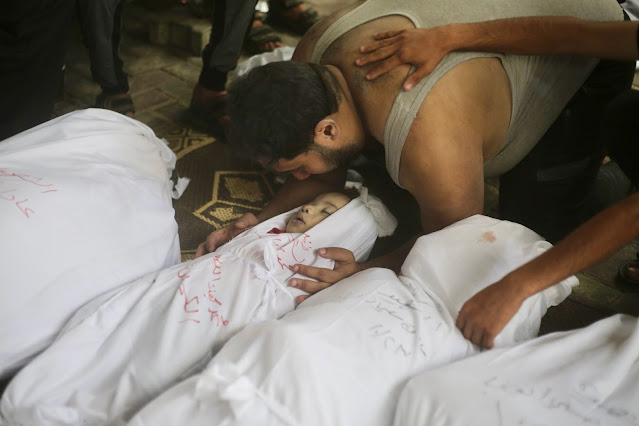A relative mourns as he holds the body of a child killed in an Israeli airstrike in the southern Palestinian city of Rafah, Gaza Strip, Oct. 23, 2023.
At least 28 people were killed in an overnight airstrike in southern Gaza, according to Palestinian authorities. The Palestinian Interior Ministry in Hamas-controlled Gaza announced the news in the early morning hours of October 24. Israeli airstrikes killed at least 28 people and wounded dozens in the southern city of Rafah overnight. Israeli airstrikes also struck homes overnight in other parts of Gaza, including Beit Lahia in the north and Khan Younis in the south.
Israeli military officials earlier announced that they would step up airstrikes on Gaza. Health officials in the Gaza Strip announced that at least 5,087 people had been killed in Israeli airstrikes through October 23, including 2,055 children and 1,119 women, and more than 15,000 injured. Huge numbers of troops and tanks were massed on the Gaza Strip border as Israeli military forces conducted ground operations in the besieged Gaza Strip.
According to Palestinian officials and witnesses, heavy airstrikes destroyed buildings across Gaza, including areas where Palestinians have taken refuge, killing hundreds of people and sending a new wave of wounded to already full hospitals. At least about 1.4 million Palestinians have been displaced from their homes in the Gaza Strip, with nearly 580,000 of them huddled in UN-run schools and shelters, the UN said on October 23.
The death toll in the Gaza Strip rose rapidly as Israe militants stepped up air strikes that collapsed and flattened buildings in preparation for a final ground offensive. The U.S. recommended that Israel delay the invasion to allow time to negotiate the release of hostages taken by Hamas during the brutal October 7 invasion.
The Gaza Strip, with a population of approximately 2.3 million, is experiencing shortages of food, water, and medicine due to Israel's border blockade. Israel still prohibits the entry of fuel, and the UN said aid distributions will cease within days if it is unable to supply fuel to trucks within the Gaza Strip. The constant influx of casualties has made it difficult for hospitals to keep generators running to power life-saving medical equipment and incubators for premature babies. Aid supplies will not be distributed in Gaza City and other areas in the north, where hundreds of thousands of people remain.




No comments:
Post a Comment